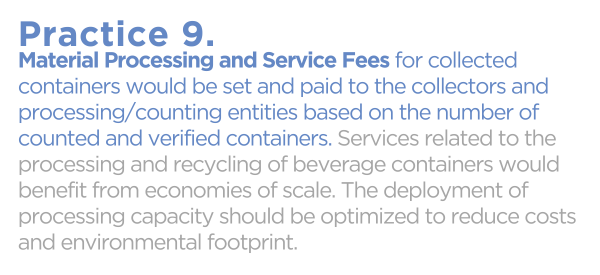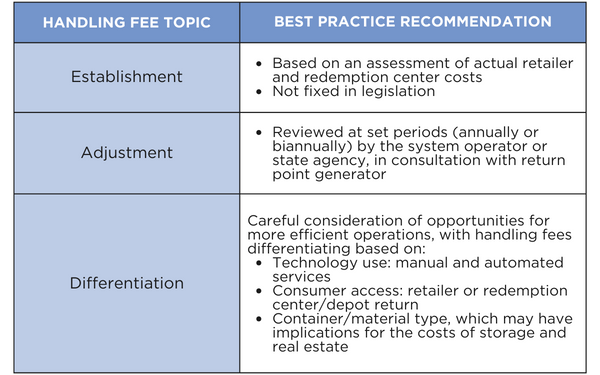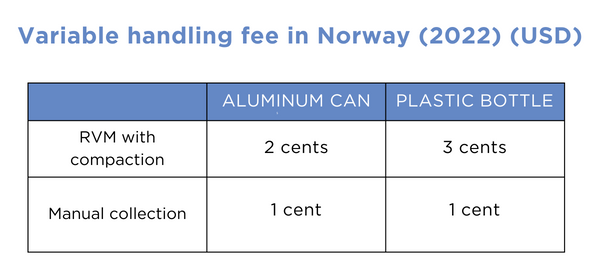We’re nearly there!
Welcome to the 19th, and penultimate, issue of Bottle Bill Common Ground — a limited-series newsletter from Reloop North America highlighting evidence-based guidance for policymakers, industry, and advocates working on bottle bills. (If you haven’t read our first 18 issues, you can do so here.)
We are now focused on 10 essential practices — requirements on how to build, run, and maintain a modern deposit return system (DRS) for beverage containers. The ninth essential practice is:

Effective DRSs work with return point operators to ensure the efficient collection of large quantities of beverage containers from consumers. As we learned with Principle 6: Fair Pay for Service Providers, the businesses providing that service receive a per unit “handling fee” to offset the costs incurred in hosting and operating a return point. And that handling fee needs to be fair.
The entities involved in preparing containers for shipment to final recycling markets by sorting, counting, crushing, and/or baling the various materials are also typically paid a fee for each eligible container they process. This payment is often referred to as a “processing fee.”
Handling Fees
Appropriate and fair handling fees encourage investments by the redemption location. Principle 6 outlines the key factors to consider when setting handling fees, but when it comes to regulatory best practices, here are the main topics and recommendations to take into account:
Processing Fees and Requirements
Processing fees are typically negotiated in a service contract and set on a per container or tonnage basis. They tend to be most influenced by material and size of container, sales volume, who owns the scrap material, and the level of automation involved in processing the containers.
Effective legislation also sets out processing requirements for deposit initiators, such as producers or distributors, to ensure they take back their containers from the retailers they deliver to or from the authorized redemption center that serves those retailers. Some DRS jurisdictions also require:
- Minimum pickup frequency (e.g., once every two weeks)
- Volume-based pickup requirement (e.g., once 10,000 beverage containers are amassed)
- Minimum operating hours for return points
Implementing robust quality assurance processes for reconciling depot and/or processing center counts, particularly for manual collections, is crucial for minimizing the potential for overcounting and other fraudulent activity within a DRS. In instances where the use of automated counting and sorting equipment for containers is minimal, ensuring effective quality control measures becomes paramount.
Incidents of counting centers inflating the reported number of containers for their own financial benefit have been observed in both Canadian and U.S. programs. While auditing procedures have been implemented to address and curb such fraudulent actions, legislators must continue to prioritize mitigation strategies to safeguard the integrity of the system.
Just as meaningful deposit levels are essential for achieving high redemption rates, handling fees are a critical part of what makes DRSs work well. This is especially true in jurisdictions where there is no legal obligation on retailers to provide take-back services. Handling fees should be determined based on the actual cost of service.
Similarly, careful determination of processing fees and requirements greatly impacts system outcomes. Experience shows considerable benefits of automation in reducing fraud. And the use of spot audits to verify the number of declared containers against the number received at processing centers serves as a valuable tool in mitigating potential fraud within the system.
Case Study: Norway
In Norway’s DRS, the handling fee incorporates the costs of staff time, retail space utilized, and any RVM capital costs, with a premium placed on efficient operations. Consequently, manual collection receives a lower handling fee, to reflect the fact that a compacting RVM enables efficiencies in transportation since a truck can fit more containers. Compacted containers are also more fraud-proof.
Infinitum is the system operator. Its board, which includes equal representation from the beverage and retail industries, sets the handling fees. This encourages transparency and fair decision-making.
Since Infinitum works as a single material owner, the material can be collected and processed together and does not need to be separated by brand, which further increases the efficiency of the system. All revenues from the sale of material are reinvested back into the system.
Thanks for reading! We encourage you to share this newsletter widely with those who want or need to know about these principles and practices. Working together from a common ground of knowledge, we can move good bottle bills forward. Sign up here to get these blog posts as emails.


